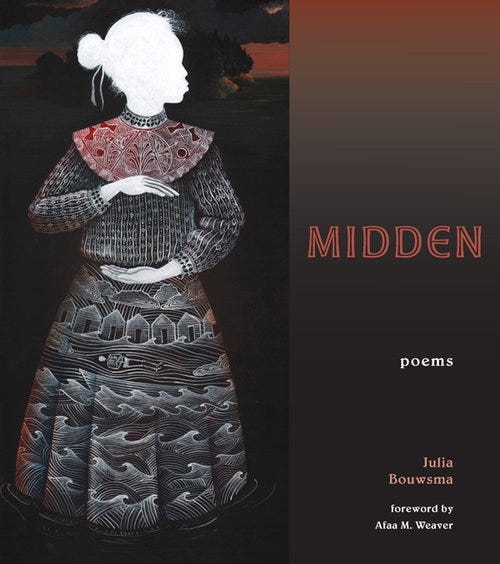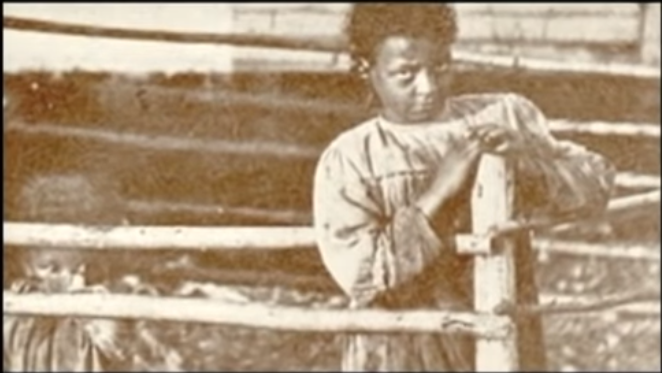
It has been said that hearing the word Malaga is like hearing the word Dachau. Research the Malaga incident, and one will find it consistently referred to as a stain on Maine’s history, an open wound for descendants of the people that settled on this 10-acre island off the coast of Phippsburg, and the reminder of a painful past for those who call Maine home. It has suffered woefully inadequate efforts at contrition, and it reeks of the rise of the eugenics movement, of which the state of Maine was a strong supporter. It is a case study in oppression, segregation, and racism, and it is this miasma into which poet Julia Bouwsma enters.
It’s a fool’s walk, and Bouwsma knows it. “I have sought to write equally into both the horror of silence and the horror of fact,” she writes in the afterword of Midden (Fordham University Press, 2018), a poetry collection that she said serves as her version of this island’s history. The book is an aesthetically beautiful piece that includes some historic photos, a gracious foreword from Afaa M. Weaver, and a comprehensive afterword by the author. Poetry is uniquely suited to tell this complicated story, and Bouwsma is uniquely suited to tell it. While it does not purport to be complete, it is capacious. While it does not endeavor to be curative, it arcs deeply toward empathy. It is brutal in its honesty without relying on being factual. Words printed, bound, and read in public consecrate. Czesław Miłosz wrote that poems should be written “rarely and reluctantly, under unbearable duress and only with the hope that good spirits, not evil ones, choose us for their instrument.” When that happens, consecration can be a kind of healing.
Coastal Maine’s Malaga Island was settled by mixed race descendants of a freed Black slave named Benjamin Darling, whose family became the cornerstone of its population. As the 19th century began, the value of pristine island land became apparent, and the eyes of mainland residents veered toward Malaga. By then, its residents had lived on the island for generations. Racist propaganda spread: the residents were born with horns; they lived underground. In 1912, mainland residents traveled to the island with a plan, forcing marriage on those living together, shooting their dogs, ousting islanders from their houses.
Some residents floated their belongings across the water to Sebasco, where they encountered mainlanders waiting with guns. Some were institutionalized. Bodies were disinterred from the island’s cemetery and relocated in an effort to erase the community completely. That’s the story. You can read about it — but not a lot. Silence once seeded, grows. Though Bouswma’s research was exhaustive, information is scant: records were meager and stories were secreted. Almost as if they weren’t there at all.
One of the prisms through which the poet refracts this story is via the voices of the Tripp family, ejected from their home and unable to find a place to relocate, and the Marks family, taken from the island and committed to the Maine School for the Feeble-Minded, an institution underpinned by the belief in eugenics as the pervading model of social reform, a history of abuse, and forced sterilizations. In “So Many Things,” a poem written in the voice of Abbie Marks, a final line attempts to capture the ignorance of racial prejudice at the core of this story, and, readers will surely recognize, others like it.
[…]They will come for us. They will take
us to another place. Each night, I pick my way down
the beach. I stretch my hands to the sea — an expanse
of dark tongues surrounds us. Each morning I rise, mouth
aswirl with bitterness. I reheat the cornbread, I crumble
the salted fish. So many things they do not know I know —
Another essential structural element of Midden is revealed in a series of poems with titles that begin “Dear ghosts.” They are based on the poet’s interactions with spirits thought buried, emerging from the past. The sequence provides a critical tool to decenter authority and provide the dialogic element of this collection. The ghosts are antagonistic; they haunt and guide, plaint and terrify with messages both opaque and pointed, playing out the poet’s ethical duty, until the moving detente of ghost and poet that occurs in a final invocation.
In the poem, “Dear ghosts, because you are dead and restless,” the speaker feels the ghosts’ leer as they remind her of the privilege of living, and the treachery of disregard.
[…]
How does it feel to touch? you taunt. How does it feel to own, to lose, to bleed?
Your laughter is a water glass breaking between my hands in the sink —
sudden invisible fracture, slow splinter working its way under.
Is this what it means to descend? Stories cut straps into flesh,
burrow your skin with welts. But if you erase a story —
if I press my arms tight to the doorframe, then step away —
my arms will try to fly from my body.

Bouwsma employs this authorial intrusion to claim and unclaim her stake in this story’s telling, and the reader is privy to the unknotting of the complex negotiation of editorial authority. Who doesn’t carry their own erasures / silently in their spines, limbs horizoned to the past? another of the sequence of poems asks. Here is an excerpt from “Dear ghosts, how can we stop the sunlight spinning the story:”
[…] Too often the poems fingers
are clumsy with distance, grief the long thread I fail to tie.
Would it matter if I told you of my own ancestors? Bodies packed
in cattle cars, bodies prodded into dividing lines, the gloved hands that choose
another’s fate. Goose -flesh skin surrendered to the clutch of shower tiles,
the final dark release of their bodies coiled into the air. All I know is this:
even before I was born I breathed a loss not my own.
The poet’s personal narrative animates this struggle and serves as the book’s meridian. “Brevity holds the horror until we are ready to receive it in its fullness,” says Weaver about this collection in the foreword, and fittingly, this nexus is withheld but not concealed. Poems reveal that the speaker has made a home in Maine on property with a cemetery that had fallen into disrepair. Restoring and clearing the land would honor the dead, but disrupt those interred there. This story, which weaves through the collection, a delicate, vulnerable ars poetica, creates a vivid parallel to the stories of Malaga, revealing the haunting consequences of silence. What is beneath the ground you and I are walking on? this book asks. How do we inhabit land that is not ours?
Erasure, an essential theme, is enacted with original text of a 1909 article “The Queer Folk of the Maine Coast,” written about the residents. Other primary source material include an image of a document that depicts the cold math of the tally of residents to be ejected, and a photo reprinted in the book called “The Tray of Spades.” Cropped from the original, it depicts Annie Parker, young Pearl Tripp, and Pearl’s older sister Abbie behind a fence on the island. No good every comes of a mainlander staring into your open door, the accompanying poem advises, and Annie’s face boils over with the sentiment. The photo, it is revealed, finds its way to Boston where it “sells and sells.” Bouwsma fills the space around it, bringing Abbie, who looks into the camera, to speculative life:
She could follow her feet out of this gate, scrabbling
over the rocks and broken shells to the bay.
Instead she braids her palms
to the top of the fence post, elbows bent
to the rails, torn dress falling all around her
loose and streaked as eider wings.
The white man lifts his black box again, says,
Stand still.
[…]
And yet. While the poet impugns the exploitative voyeur, the poem “The Tray of Spades,” to be sure, is an act of looking. It is a vulnerable place from which to light shadowed corners. But silence, the only alternative, plays the long game. In “Untold,” it’s as quiet as an “i” slowly softening to an “e” as indifferent years assemble themselves: History cracks our spines like green pine in the sun until there’s / no need for words, no need to tell the children. One need look no further than the beaver in “The Way Home” that hangs in a shed, a symbol of displacement and intention, her body frozen and still, / upside down in the dark to understand its chilling consequences. Bouwsma risks it, and names those voices she is carried by — Molly McCully Brown, Tarfia Faizullah, C. D. Wright, Carolyn Forché, and Natasha Trethewey, among others (though not named specifically, I felt the book’s kinship with M. NourbeSe Philip’s Zong!). They are poets, as Bouwsma, whose vulnerabilities and restraint create a release valve to the pressure of telling, and whose urgency to trouble the past throbs beneath their words.
Publications like Life eventually published grim exposés about institutions like the Maine School for the Feeble-Minded, where the Marks family was sent after their eviction from their home at Malaga. They were meant to horrify the public, and they did. The facility, eventually renamed Pownal State School and then Pineland Center, endured allegations of abuse and negligence, class action suits and reorganization, until community-based care brought about its close in the 1990s. Today, previous residents of Pineland live in the community. My aunt, who grew up there and is now in her sixties, is one. She lives in a group home in a neighboring town.

I attended one of Bouwsma’s readings in Maine in a town or so over from Malaga, now a recreational space for visitors, with historical information available at a kiosk. The audience contained at least one descendant of Malaga. During the Q&A, this woman spoke with raw emotions and deep appreciation for the book. That it exists, that her relatives’ names are on its pages, and that we were gathered there to talk about it, had moved her. “I can only say these poems are meant to live in the space between what is known and what is unknown — to speak both of the place from which they come and the distance from which they were written,” writes Bouwsma in the afterword. Midden, the collection’s title, is a term used for a dump of domestic waste, a pile made of toenail shell, pilfered spoon, and a weasel’s yellowed jawbone. With this collection, Bouwsma casts her version of the story to the heap. In doing so, she rescues a some of the lives discarded by those in power who would treat them as nothing but trash.
Pineland was purchased in 2000 by a charitable state organization, and today it is a farm and recreational facility. I am writing this at the artist community supported by the same organization. The words Pineland Farms are painted on the window of the General Store where we gather daily for coffee and egg sandwiches before we go to our studios to write and make art. Here, the future is saturated with the past and there is a tacit hope that people who are good instruments continue to name the things that make the midden mound.
The Consequences of Silence in Julia Bouwsma’s Midden was originally published in Anomaly on Medium, where people are continuing the conversation by highlighting and responding to this story.
